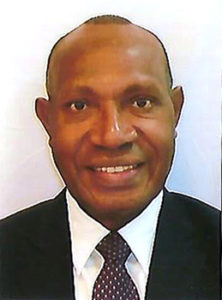Papua New Guinea will have to dramatically expand its small and medium enterprise (SME) sector if it is to achieve middle-income status by 2030, according to Steven Maken, Managing Director of the Small and Medium Enterprises Corporation (SMEC) of Papua New Guinea. That will involve dealing with some key constraints.

The SMEC’s Steven Maken
There are 49,900 formal small and medium-sized enterprises in Papua New Guinea, 90 per cent of which are male-owned.
According to Maken, SMEs contribute 6 per cent to Gross Domestic Product (GDP). They are mostly concentrated in: wholesale, retail, agriculture, tourism and fisheries.
‘The aim is to reduce unemployment to 49 per cent from 84.1 per cent.’
Only 0.7 per cent of SME output is currently exported.
The SMEC, which was established in 2014 as a Commercial Statutory Organisation under the Department of Trade and Industry, will be one of the government bodies assisting with achieving these targets, according to Maken.
Targets
Maken said the government’s target is to increase the number of SMEs to 500,000 by 2030 and to create two million new jobs.
‘The aim is to reduce unemployment to 49 per cent from 84.1 per cent,’ he said.
‘The intention is to increase the GDP contribution by SMEs to 50 per cent (from 6 per cent) and reduce poverty from 40 per cent to 30 per cent.’
‘The strategic aim is to increase income per capita from US$2000 to US$9000.’
The growth of SMEs is also related to the drive to increase financial inclusion, said Maken. Another aim is to reduce the unbanked population [those who do not have a bank account] from 85.6 per cent to 40 per cent by 2030.
Maken noted that the strategic intent is to increase income per capita from US$2000 to US$9000.
Improving loan conditions is also critical:
‘Our friends in the National Development Bank have been able to reduce the interest rate down to 6.5 per cent.’
Management
Maken said another aim is for PNG citizens to own 70 per cent of the formal economy by 2030, up from the current level of 10 per cent.
He did acknowledge that a lot of SME failures are due to management, but identified seven constraints that face PNG SMEs. These are:
- Access to credit finance
- Access to business or commercial land
- Entrepreneurship training and capacity building
- Access to markets and market information
- Access to physical and business infrastructure
- Access and application to information and communications technology (ICT) and e-commerce
- Enabling policy, legal and regulatory environment.
Priorities
He said the government was looking at trade and foreign investment legislation.
‘We need to work harder to support and bring up the growth of the SME sector.’
‘We must support those that are already there and throw more into that space.’
He said the current government focus and priority has been on health and education, but ‘those parts cannot be sustained going forward’ without developing the private sector, especially SMEs.
Maken noted that the government recognises that SMEs are ‘the engine’ of the private sector.
‘To take advantage of market opportunities we must breach the digital divide and (engage in) capacity building.’
He added that his organisation will be using the APEC forum to ‘extract the best practices for SMEs’.
Wera Mori, the Minister for Commerce and Industry, said the sector offers the best prospects for growth.
‘We need to work harder to support and bring up the growth of the SME sector.
‘With a growing population, that is where we need to seriously look at.’








Speak Your Mind